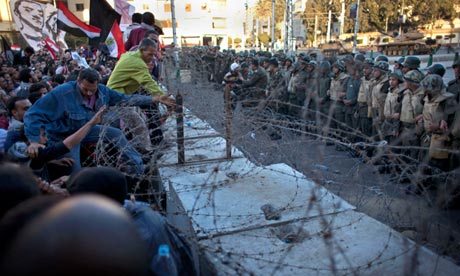
Opponents of Egypt's president Mohamed Morsi try to enter the presidential palace in Cairo.
Egypt's opposition National Salvation Front (NSF) has angrily rejected calls by the president, Mohamed Morsi, for a national dialogue and warned that he has lost legitimacy after recent unrest and bloodshed.
Amid new demonstrations in Cairo by supporters and opponents of the Muslim Brotherhood leader there was no sense that the country's now violent political crisis was easing as the second anniversary of the 2011 revolution approaches.
"Egypt is Islamic, it will not be secular, it will not be liberal," angry crowds chanted at a funeral procession for two Morsi supporters at the city's al-Azhar mosque on Friday. Opposition leaders were scorned as "murderers".
Thousands took to the streets again and marches from different parts of the capital converged on the presidential palace in Heliopolis, now surrounded by barbed wire, tanks and scores of Republican Guardsmen. At one section a wall had been built overnight to keep protesters at bay.
Later hundreds of protesters broke through the barricades but the troops offered no resistance. Other opposition supporters remained in Tahrir square in the centre of town.
"After the bloodshed we will not put our hands in the hands of those who killed new martyrs," declared Hamdeen Sabahi, another leading figure in the NSF.
Mohamed ElBaradei, the NSF's chief co-ordinator and a Nobel laureate, called on opposition groups to shun dialogue with Morsi. We want "a dialogue not based on an arm-twisting policy and imposing fait accompli," he said on Twitter. George Ishak, another opposition leader, said: "Whoever has killed his own people has lost legitimacy."
As the crowds swelled later in the evening there was more pressure on the barricades manned by the Republican Guard. The military had set up barbed wire along the perimeter of the palace, and in one section a cement-block wall. Tanks and armoured personnel carriers were parked behind the barricades.
Eventually protesters broke through, the stationed troops offering no resistance and in some cases removing the barricades.
Protesters spilled through the barbed wire and moved to the palace gates. Some stood on the tanks as the troops remained while the protesters had the run of the perimeter, as they did last Tuesday after a similar rally, though in that case the police were manning the barricades and they withdrew completely.
Egypt, scene of the second and biggest revolution of the Arab spring, was plunged into crisis on 22 November when Morsi issued a controversial decree stripping the judiciary of any power to challenge presidential decisions.
Clashes between his supporters and opposition protesters on Wednesday claimed seven lives and caused 700 injuries, with the opposition holding the president directly responsible.
Morsi addressed the nation late on Thursday but failed to offer any concessions on a decree granting him extraordinary powers and judicial immunity or on a referendum he has called for 15 December on a draft constitution that has been rejected by the opposition.
He called for dialogue with opposition starting on Saturday but the NSF rejected the call unless the decree was first revoked and the referendum cancelled.
"We maintain our demands to revoke the decree and cancel the constitution," Ishak said. "Morsi promised a constitution that would have national consensus. This constitution doesn't and now it is bloodied."
Morsi insisted that the decree was necessary to end Egypt's turbulent transitional period and that his special powers would lapse once the new constitution was passed. Critics complain that his powers exceed even those wielded by the deposed Hosni Mubarak, who ruled for nearly 30 years.
But the draft has also been attacked for its weaknesses on rights and freedoms and a creeping sense of religiosity in the text. It has also been criticised for the mainly Islamist and male makeup of the assembly that drafted it after Christian, female and liberal members withdrew.
Morsi also railed in his speech against hired thugs connected to some members of the opposition who were behind Wednesday's violence. He did not place any blame on his own supporters who headed to the presidential palace that day to break up a sit-in only hours after the Brotherhood's political arm, the Freedom and Justice Party, had announced that its supporters were on their way there.
Late on Thursday the US president, Barack Obama, called Morsi to express his "deep concern" over the recent protests. The White House said Obama welcomed Morsi's call for talks but stressed they should be "without preconditions". In Cairo one demonstrator was seen carrying a placard reading: "Obama. Your bitch is our dictator."
Rival protests also took place in Alexandria and Luxor in the south. The two sides pelted each other with stones outside the headquarters of the Brotherhood office in the Nile delta city of Kom Hamada in the province of Beheira. In the Delta industrial city of Mahalla, protesters cut railways and announced a sit-in until the cancellation of Morsi's decrees and next week's referendum.

No comments:
Post a Comment
Note: Only a member of this blog may post a comment.